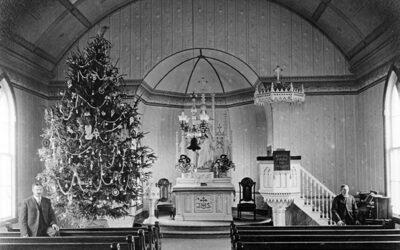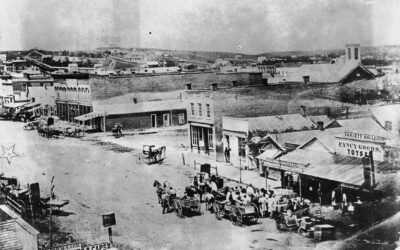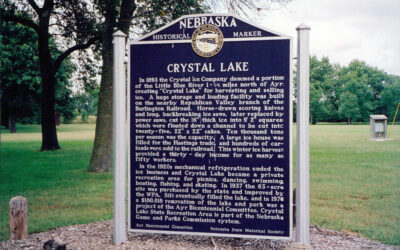HISTORY NEBRASKA MANUSCRIPT FINDING AID
RG3640.AM: Gilbert Monell Hitchcock, 1859-1934
Papers: 1894-1936
Omaha, Douglas County, Neb.: U.S. Senator; newspaper publisher
Size: 2 boxes, 1 scrapbook, and 1 reel of microfilm
BACKGROUND NOTE
Gilbert Monell Hitchcock was born in Omaha, Nebraska on September 18, 1859, the son of Phineas W. and Annie Monell Hitchcock. His father was prominent in Nebraska politics, and served as United States Senator from Nebraska, 1871-1877. Gilbert Hitchcock received his early education in the public schools, and later studied in Baden-Baden, Germany. Upon his return to the United States, he enrolled in the Law College of the University of Michigan from which he received his law degree in 1881. In the same year, Hitchcock was admitted to the Nebraska Bar, and began the practice of law in Omaha. In 1885 he established the Omaha Daily World, an independent newspaper, and in 1889, purchased the Omaha Herald. These papers were combined to form the Omaha World Herald, which was first published on July 18, 1889.
Hitchcock (a Democrat) soon became active in Nebraska politics, and was a supporter of free silver and other policies advocated by William Jennings Bryan. In 1894-1895 Bryan assumed nominal editorship of the World Herald, which offered a forum for the presentation of his political philosophies. In return for the editorial chair, Bryan and several of his associates purchased stock in the World Publishing Company. Although this arrangement proved mutually advantageous, Bryan and Hitchcock gradually became estranged, partially because of Hitchcock’s own desire to enter Nebraska politics. Although the World Herald continued to support Bryan during his presidential campaigns, the rift between the two men became irreparable during the administration of President Wilson. Bryan, who was Secretary of State in Wilson’s Cabinet, was opposed to the President’s war policies, while Hitchcock, then in the Senate, was one of the President’s staunchest supporters.
Hitchcock’s own political career began in 1902 when he was elected to the House of Representatives from Nebraska’s second District. He won re-election to this seat in 1906 and 1908. During his three terms in the House, Hitchcock supported the establishment of a postal savings bank, and took an active part in an investigation of coal land frauds which resulted in the removal of Secretary of the Interior Ballinger. In 1910 Hitchcock ran for the U.S. Senate, defeating E.J. Burkett in the election conducted by the Nebraska Legislature. He was re-elected to the Senate in 1916 for an additional six-year term. While a member of that body, Hitchcock was a member of the Foreign Relations, Military Affairs, Philippines, and Banking and Currency Committees. He was active in the legislation which resulted in the income tax and the direct election of Senators, and took part in the passage of the Underwood tariff bill, and the Federal Reserve Act. Hitchcock also supported numerous other pieces of legislation including the Clayton Anti-Trust Act, the Federal Trade Commission Act, and the Alaska Development Act. Perhaps Senator Hitchcock’s most significant contribution while in the Senate was his leadership of the fight for the ratification of the Treaty of Versailles and the Covenant of the League of Nations in 1919-1920. Although strongly supported by President Wilson, the treaty failed to be ratified by the Senate.
The post-war reaction, and Republican political victories, resulted in Hitchcock’s defeat for the Senate seat by Robert B. Howell in 1922. In 1930 Hitchcock was again unsuccessful in his bid for re-election to the Senate, being defeated by Senator George W. Norris in the primary election. When Senator Howell died in 1933, Hitchcock was unsuccessful in his attempts to secure the appointment from Governor Charles W. Bryan. Gilbert Hitchcock was active in the civic affairs of Omaha, and an annual scholarship is still awarded in his memory by the Omaha World Herald to Outstanding Graduates of Omaha High Schools. Hitchcock married Miss Jesse Crounse of Ft. Calhoun, Nebraska, on August 30, 1883, and the couple was to have two daughters, Margaret and Ruth. Following the death of his first wife, in May 1925, Hitchcock married Martha Harris in 1927. Gilbert M. Hitchcock died in Washington, DC, on February 3, 1934.
SCOPE AND CONTENT NOTE
This collection consists of two boxes and one scrapbook of manuscript material arranged in eight series: 1) General Correspondence, 1894-1926; 2) Family Correspondence, 1912-1936; 3) Speeches and Manuscripts, 1924-1925 and undated; 4) Financial Papers, 1894-1924; 5) Printed Matter, 1899-1930; 6) Miscellany; 7) Scrapbook, 1934-1960; and 8) Political Correspondence, 1904-1924. The bulk of this collection consists of correspondence and financial records relating to the career of Gilbert M. Hitchcock as publisher of the Omaha World Herald, 1894-1934 and as U.S. Senator, 1910-1922. The collection includes papers relating to the early business transactions with William Jennings Bryan, establishment and operation of the Omaha World Herald, and clippings relating to his senatorial career. Photocopies of letters written by Mrs. Hitchcock about social life in Washington during Hitchcock’s senatorial career are also included in the collection.
Series 1 consists of letters, most of them written to Senator Hitchcock by World Herald business manager Henry Doorly, regarding the maintenance and expansion of the World Herald. Letters explaining new press and photographic procedures are included. Series 2 consists of letters written by Mrs. Hitchcock and her daughters Ruth and Margaret (Mrs. Henry Doorly). Hitchcock’s speeches and a thesis entitled “The Congressional Career of Gilbert M. Hitchcock” are contained in Series 3.
Series 4 contains financial papers of the World Herald including incorporation papers and bylaws, business agreements between William Jennings Bryan and Hitchcock, lists of stockholders, prospectuses, estimates for the proposed World Herald and Prudential Insurance Company of America. Audits, operating statements, publications of an office building and managers organization, and accounts of Bryan are also included in this series. Series 5 contains newspaper clippings dealing with Hitchcock’s senatorial action and campaign pamphlets. Series 6 consists of public relations pamphlets, and correspondence regarding contributions made to the collection. Series 7 is one scrapbook containing Hitchcock’s obituaries. Series 8 consists of 60 letters and telegrams relating to patronage and presidential politics. A calendar of this series is available on-site.
Series 1, folder one and parts of Series 4, folder two, are on one reel of microfilm filmed by the Gilbert M. Hitchcock foundation.
Note: See the photo component [RG3640.PH] for related images. HN holds numerous manuscript and public records collections containing correspondence of Gilbert Hitchcock. See the HN Library Catalog and the Nebraska History index for various publications and articles by and about Gilbert M. Hitchcock.
INVENTORY
Series 1 – General Correspondence, 1894-1926
Box 1
Folder
- 1894, undated (film)
- 1910
- 1914
- 1915
- 1917
- 1919
- 1920
- 1922
- 1923
- 1924 (film)
- 1925
- 1926
Series 2 – Family Correspondence, 1912-1936
- Mrs. Gilbert M. Hitchcock, letters, 1912-1925 (photocopies)
- Ruth Hitchcock, letters 1921-1936 (photocopies)
Series 3 – Speeches and Manuscripts, 1924-1925, n.d.
- Speeches, 1924-1925, n.d.
- “The Congressional Career of Gilbert M. Hitchcock,” M.A. thesis by Paul Polmantier, 1935(?)
Series 4 – Financial Papers, 1894-1924
Box 2
Folder
- Incorporation papers, mortgage, and bylaws of the World Herald
- Agreements with William Jennings Bryan, 1894-1895 (film)
- World Herald agreements, 1895-1915
- List of stockholders, prospectuses, record of transactions (film)
- Costs and estimates for proposed World Herald building
- Indenture between Prudential Insurance Co. of American and World Herald and loan agreements
- World Herald monthly statements, 1916-1924
- Audits, 1913-1921
- Building Owners and Managers Association of Omaha Office Building Experience Exchange, 1920-1921
- Accounts to W.J. Bryan, 1895 (film)
Series 5 – Printed Matter
- Newspaper Clippings, 1899-1930
- Campaign pamphlets
Series 6 – Miscellany
- World Herald public relations material
- Correspondence regarding contributions to collections
Series 7 – Scrapbook, 1934-1960
Scrapbook (see oversize)
Series 8 – Political Correspondence, 1904-1924
- Political Correspondence
Subject headings:
Bryan, William Jennings, 1860-1925
Gregory, Thomas W., 1861-1933
Gruenther, C.M.
Hitchcock, Gilbert Monell, 1859-1934
Hitchcock, Jessie (Crounse), -1925
McAdoo, William Gibbs, 1863-1941
Merideth, Edwin T.
Mullen, Arthur F., 1873-1938
Nebraska — Politics and government
Newbranch, Harvey, 1875-1959
Newspapers — Nebraska — Omaha
United States Congress. House of Representatives
United States Congress. Senate
Wilson, Woodrow, 1856-1924
World Publishing Co. (Omaha, Neb.)
ht 10-13-1973
Encoded TMM 05-04-2010



